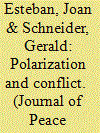|
|
|
Sort Order |
|
|
|
Items / Page
|
|
|
|
|
|
|
| Srl | Item |
| 1 |
ID:
080981


|
|
|
|
|
| Publication |
2008.
|
| Summary/Abstract |
Recent formal and empirical research in political science and economics strongly indicates that various forms of political and social polarization increase the risk of violent conflict within and between nation states. The articles collected for this issue explore this crucial relationship and provide answers to a variety of topics: First, contributors address how institutions and other contingent factors mediate the conflict potential in polarized societies. Second, this special issue compares the explanatory power of income polarization with traditional and new measures of inequality. Third, the contributions examine how groups form and coalitions are built in polarized societies and how this affects political decision-making. Finally, the special issue analyses the interconnections between interstate war, internationalized conflict and polarization. This introduction synthesizes the literatures that have been developed on the issue of polarization and conflict in the various social scientific disciplines. The authors particularly discuss the similarities between economic models of conflict and the so-called crisis bargaining literature which has been mainly developed within political science. The article shows the differences between `polarization' and `inequality' and introduces the various measures of diversity that have been used in the study of interstate and intrastate conflict during the past few decades.
|
|
|
|
|
|
|
|
|
|
|
|
|
|
|
|
| 2 |
ID:
080983


|
|
|
|
|
| Publication |
2008.
|
| Summary/Abstract |
This article provides a theoretical framework that distinguishes between the occurrence of conflict and its severity, and clarifies the role of polarization and fractionalization in each of these cases. The analysis helps in ordering the various definitions, and in providing explanations for the empirical observations on the relationship between conflict, on the one hand, and polarization or fractionalization, on the other. The behaviour of players in conflict is described as a game, and equilibrium payoffs to all players are computed. The status quo is characterized by a set of political institutions that channel the different opposing interests and turn them into a collective decision, with a second set of payoffs. Groups rebel against the status quo political institution whenever the latter set of payoffs is dominated by the former. When society is highly polarized, the potential cost of rebellion is extremely high, and this cost may serve as the guarantor of peace. So, in highly polarized societies, the occurrence of open conflict should be rare but its intensity very severe, whenever it happens. On the other hand, highly fractionalized societies are prone to the occurrence of conflict, but its intensity will be moderate. It matters, therefore, whether one studies the intensity of conflict, conditional on conflict breaking out, or the likelihood that conflict actually occurs. Specifically, it is shown that: (i) measures of fractionalization and polarization tend to run in opposite directions, (ii) the onset of conflict critically depends on the political system in place, (iii) the occurrence of conflict and the intensity of conflict also tend to move in opposite directions, (iv) the relationship between polarization or fractionalization and conflict is non-monotonic and (v) the intensity of conflict depends positively on the degree of polarization
|
|
|
|
|
|
|
|
|
|
|
|
|
|
|
|
|
|
|
|
|